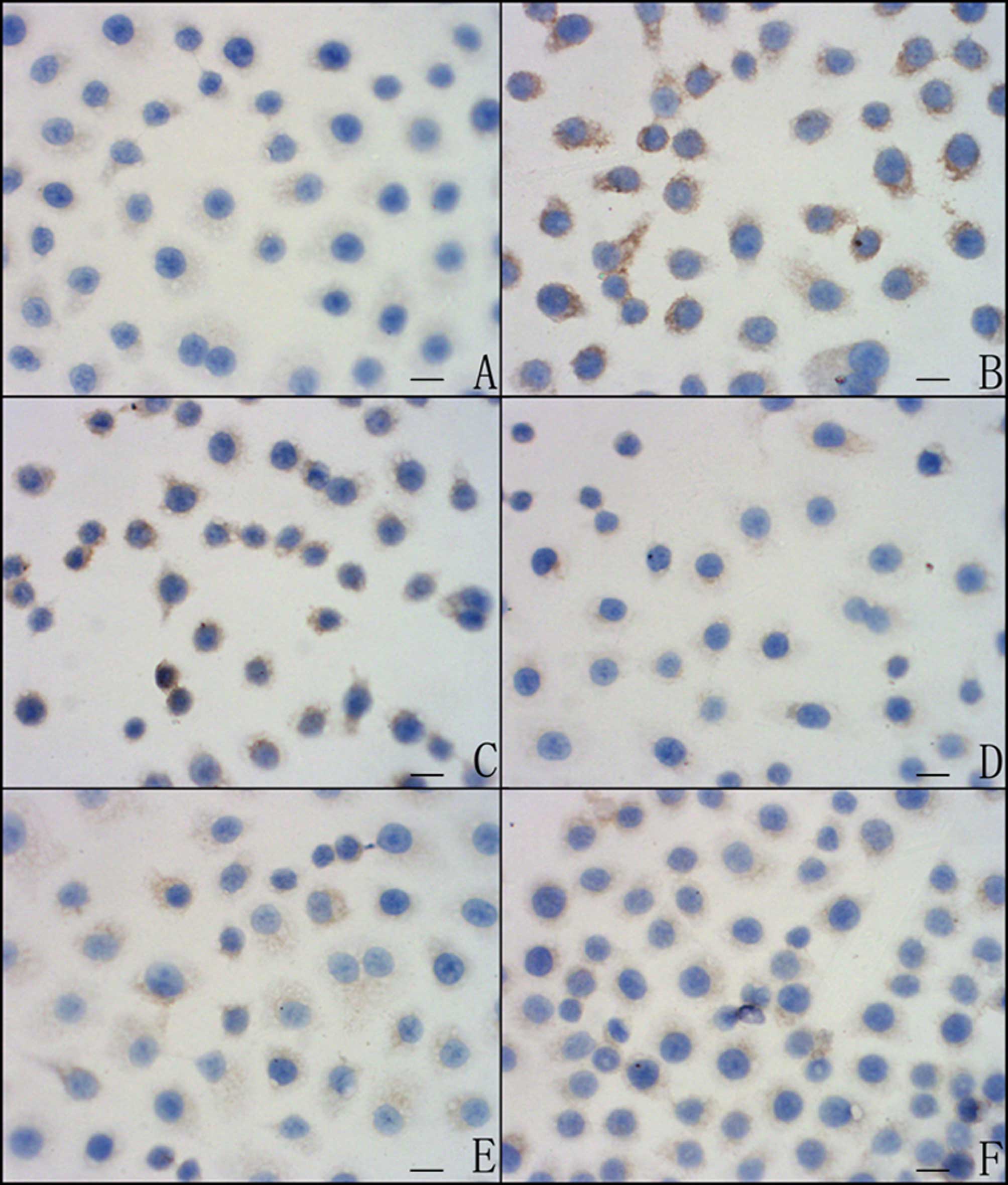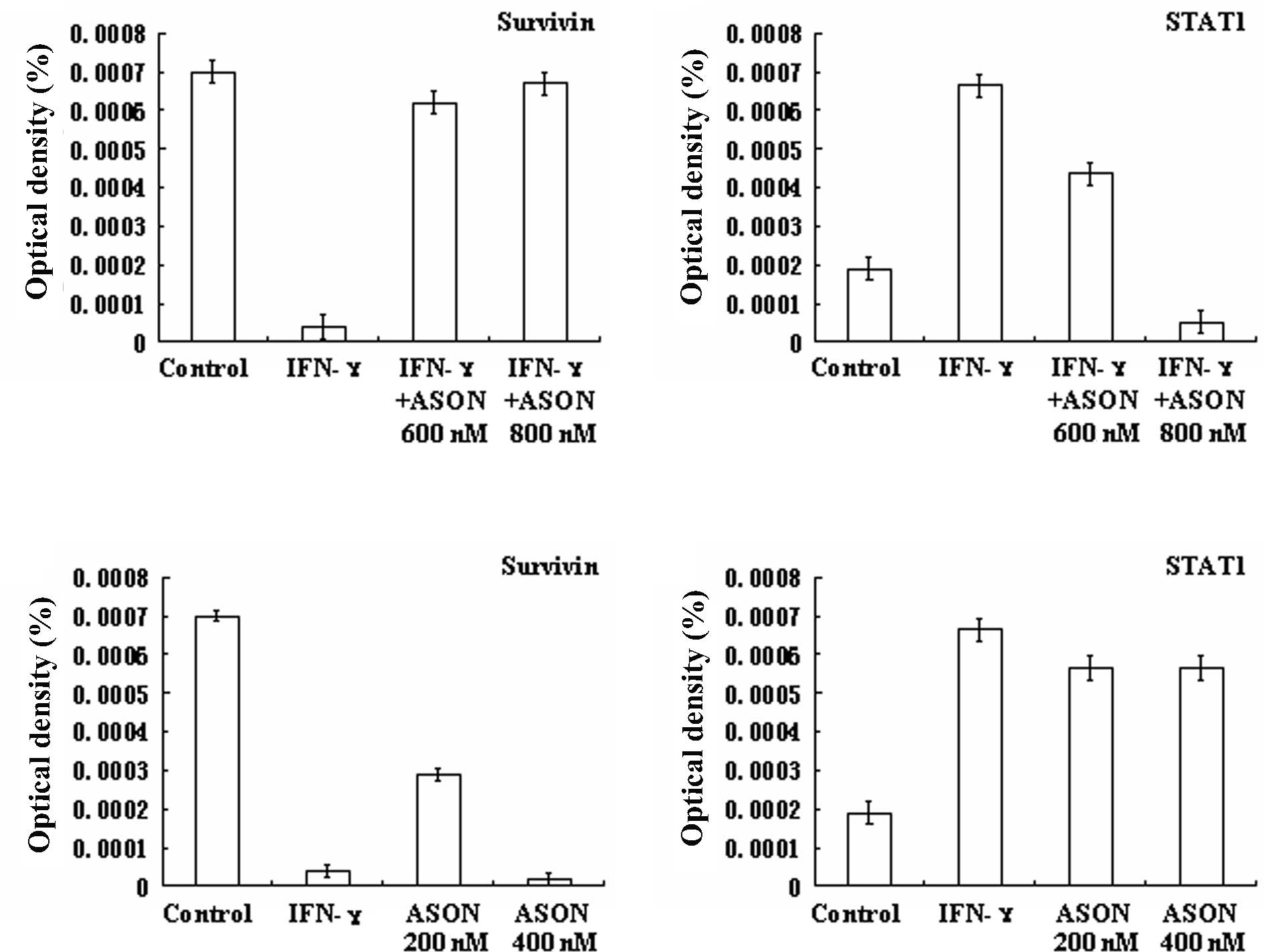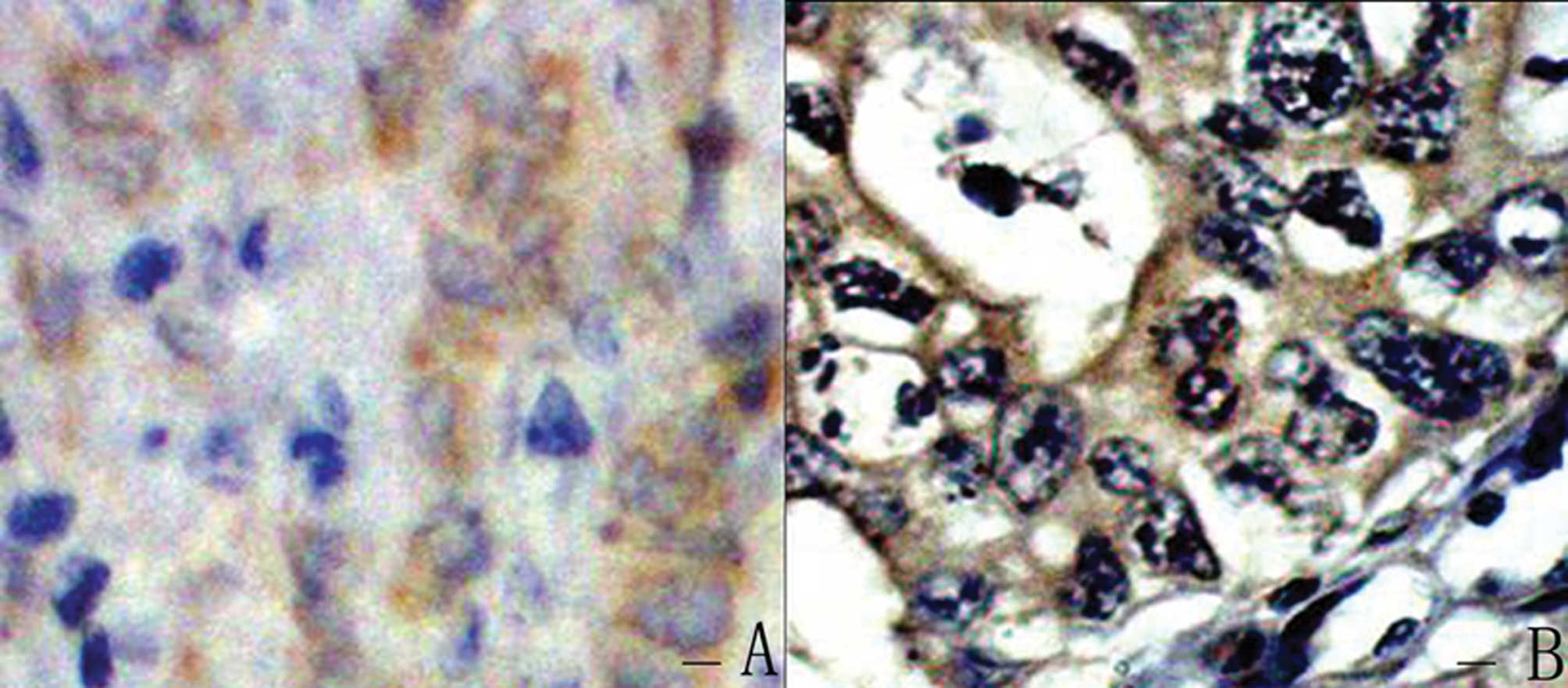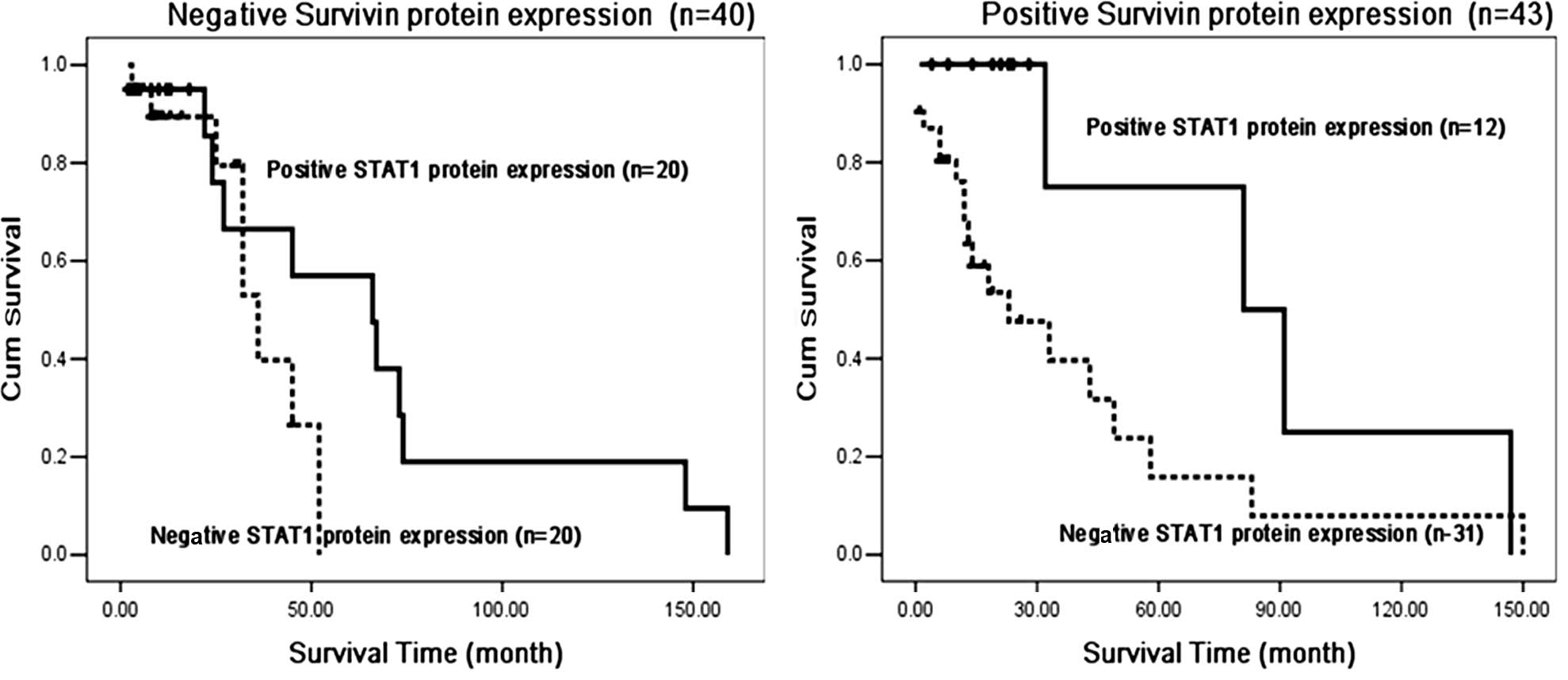|
1
|
Liu T, Wang XY, Song WJ, Zu CZ and Li Y:
Incidence of gastric malignant tumors during the past 20 years in
Tianjin. Shijie Huaren Xiaohua ZaZhi. 12:20–22. 2004.
|
|
2
|
Lanwers GY, Scoot GV and Karpeh MS:
Immunohistochemical evaluation of bcl-2 protein expression in
gastric adenocarcinoma. Cancer. 75:2209–2213. 1995. View Article : Google Scholar : PubMed/NCBI
|
|
3
|
Li F, Ambrosini G, Chu EY, Plescia J,
Tognin S, Marchisio PC and Altieri DC: Control of apoptosis and
mitotic spindle checkpoint by survivin. Nature. 396:580–584. 1998.
View Article : Google Scholar : PubMed/NCBI
|
|
4
|
Ambrosini G, Adida C and Altieri D: A
novel anti-apoptosis gene, survivin, expressed in cancer and
lymphoma. Nature Med. 3:917–921. 1997. View Article : Google Scholar : PubMed/NCBI
|
|
5
|
Kaplan DH, Shankaran V, Dighe AS, Stockert
E, Aguet M, Old LJ and Schreiber RD: Demonstration of an
interferon-γ-dependent tumor surveillance system in immunocompetent
mice. Proc Natl Acad Sci USA. 95:7556–7561. 1998.
|
|
6
|
Lee CK, Rao DT, Gertner R, Gimeno R, Frey
AB and Levy DE: Distinct requirements for IFNs and STAT1 in NK cell
function. J Immunol. 165:3571–3577. 2000. View Article : Google Scholar : PubMed/NCBI
|
|
7
|
Lee CK, Smith E, Gimeno R, Gertner R and
Levy DE: STAT1 affects lymphocyte survival and proliferation
partially independent of its role downstream of IFN-γ. J Immunol.
164:1286–1292. 2000.PubMed/NCBI
|
|
8
|
Shankaran V, Ikeda H, Bruce AT, White JM,
Swanson PE, Old LJ and Schreiber RD: IFNgamma and lymphocytes
prevent primary tumour development and shape tumour immunogenicity.
Nature. 410:1107–1111. 2001. View
Article : Google Scholar : PubMed/NCBI
|
|
9
|
Liu KD, Gaffen SL and Goldsmith MA:
JAK/STAT signaling by cytokine receptors. Curr Opin Immunol.
10:271–278. 1998. View Article : Google Scholar : PubMed/NCBI
|
|
10
|
Darnell JE Jr, Kerr IM and Stark GR:
Jak-STAT pathways and transcriptional activation in response to
IFNs and other extracellular signaling proteins. Science.
264:1415–1421. 1994. View Article : Google Scholar : PubMed/NCBI
|
|
11
|
Schindler C and Darnell JE Jr:
Transcriptional responses to polypeptide ligands: the JAK-STAT
pathway. Annu Rev Biochem. 64:621–651. 1995. View Article : Google Scholar : PubMed/NCBI
|
|
12
|
Dupuis S, Dargemont C, Fieschi C,
Thomassin N, Rosenzweig S, Harris J, Holland SM, Schreiber RD and
Casanova JL: Impairment of mycobacterial but not viral immunity by
a germline human STAT1 mutation. Science. 293:300–303. 2001.
View Article : Google Scholar : PubMed/NCBI
|
|
13
|
Durbin JE, Hackenmiller R, Simon MC and
Levy DE: Targeted disruption of the mouse Stat1 gene results in
compromised innate immunity to viral disease. Cell. 84:443–450.
1996. View Article : Google Scholar : PubMed/NCBI
|
|
14
|
Bromberg J and Darnell JE Jr: The role of
STATs in transcriptional control and their impact on cellular
function. Oncogene. 19:2468–2473. 2000. View Article : Google Scholar : PubMed/NCBI
|
|
15
|
Ouchi T, Lee SW, Ouchi M, Aaronson SA and
Horvath CM: Collaboration of signal transducer and activator of
transcription 1 (STAT1) and BRCA1 in differential regulation of
IFN-γ target genes. Proc Natl Acad Sci USA. 97:5208–5213.
2000.PubMed/NCBI
|
|
16
|
Chin YE, Kitagawa M, Kuida K, Flavell RA
and Fu XY: Activation of the STAT signaling pathway can cause
expression of caspase 1 and apoptosis. Mol Cell Biol. 17:5328–5337.
1997.PubMed/NCBI
|
|
17
|
Salvesen GS and Duckett CS: Apoptosis: IAP
proteins: blocking the road to death’s door. Nat Rev Mol Cell Biol.
3:401–410. 2002.
|
|
18
|
Srinivasula SM and Ashwell JD: IAPs:
what’s in a name? Mol Cell. 30:123–135. 2008.
|
|
19
|
Altieri DC: Validating survivin as a
cancer therapeutic target. Nat Rev Cancer. 3:46–54. 2003.
View Article : Google Scholar : PubMed/NCBI
|
|
20
|
Altieri DC: Survivin, cancer networks and
pathway-directed drug discovery. Nat Rev Cancer. 8:61–70. 2008.
View Article : Google Scholar : PubMed/NCBI
|
|
21
|
Chandele A, Prasad V, Jagtap JC, Shukla R
and Shastry PR: Upregulation of survivin in G2/M cells and
inhibition of caspase 9 activity enhances resistance in
staurosporine-induced apoptosis. Neoplasia. 6:29–40. 2004.
View Article : Google Scholar : PubMed/NCBI
|
|
22
|
Tamm I, Wang Y, Sausville E, Scudiero DA,
Vigna N, Oltersdorf T and Reed JC: IAP-family protein survivin
inhibits caspase activity and apoptosis induced by Fas (CD95), Bax,
Caspases, and anticancer drugs. Cancer Res. 58:5315–5320.
1998.PubMed/NCBI
|
|
23
|
Lu B, Mu Y, Cao C, Zeng F, Schneider S,
Tan J, Price J, Chen J, Freeman M and Hallahan DE: Survivin as a
therapeutic target for radiation sensitization in lung cancer.
Cancer Res. 64:2840–2845. 2004. View Article : Google Scholar : PubMed/NCBI
|
|
24
|
Shin S, Sung BJ, Cho YS, Kim HJ, Ha NC,
Hwang JI, Chung CW, Jung YK and Oh BH: An anti-apoptotic protein
human survivin is a direct inhibitor of caspase-3 and -7. Biochem.
40:1117–1123. 2001. View Article : Google Scholar : PubMed/NCBI
|
|
25
|
Deng H, Zhen HY, Zhou HY, Chen QX and Liu
LJ: Role of IFN-γ-STAT1 pathway in human gastric adenocarcinoma.
World Chin J Digestol. 17:1103–1107. 2009.
|
|
26
|
Deng H, Wu RL, Chen Y and Liu LJ: STAT1
and Survivin expression in full lymph node examined gastric cancer
by using tissue microarray technique. Chin Ger J Clin Oncol.
5:249–252. 2006. View Article : Google Scholar
|
|
27
|
Deng H, Huang X, Gao YJ, Zhen HY and Liu
LJ: Regulatory effect of IFN-γ on the survivin signaling pathway in
gastric adenocarcinoma. World Chin J Digestol. 18:3249–3253.
2010.
|
|
28
|
Beppu K, Morisaki T, Matsunaga H, Uchiyama
A, Ihara E, Hirano K, Kanaide H, Tanaka M and Katano M: Inhibition
of interferon-c-activated nuclear factor-κB by cyclosporin A: a
possible mechanism for synergistic induction of apoptosis. Biochem
Biophys Res Commun. 305:797–805. 2003.
|
|
29
|
Grandis JR, Drenning SD, Chakraborty A,
Zhou MY, Zeng Q, Pitt AS and Tweardy DJ: Requirement of Stat3 but
not Stat1 activation for epidermal growth factor receptor-mediated
cell growth in vitro. J Clin Invest. 102:1385–1392. 1998.
View Article : Google Scholar : PubMed/NCBI
|
|
30
|
Olie RA, Simões-Wüst AP, Baumann B, Leech
SH, Fabbro D, Stahel RA and Zangemeister-Wittke U: A novel
antisense oligonucleotide targeting survivin expression induces
apoptosis and sensitizes lung cancer cells to chemotherapy. Cancer
Res. 60:2805–2809. 2000.PubMed/NCBI
|
|
31
|
Liu LJ and Zhang YT: The clinical research
of lymph node metastasis in gastric cancer. Chin J Exper Surgery.
12:91–92. 1995.
|
|
32
|
Pennati M, Folini M and Zaffaroni N:
Targeting survivin in cancer therapy. Expert Opin Ther Targets.
12:463–476. 2008. View Article : Google Scholar
|
|
33
|
Altieri DC: Survivin and IAP proteins in
cell-death mechanisms. Biochem J. 430:199–205. 2010. View Article : Google Scholar : PubMed/NCBI
|
|
34
|
Lee J, Kang WK, Park JO, et al: Expression
of activated signal transducer and activator of transcription 3
predicts poor clinical outcome in gastric adenocarcinoma. Acta
Pathol Microbiol Immunol Scand Suppl. 117:598–606. 2009. View Article : Google Scholar : PubMed/NCBI
|
|
35
|
Li Y, Han J, Wang LF, Lin SX, Yao LB, Yu Q
and Liu XP: Characteristics of anoikis resistance of human gastric
cancer cell lines. J Fourth Mil Med Univ. 24:485–488. 2003.
|


















